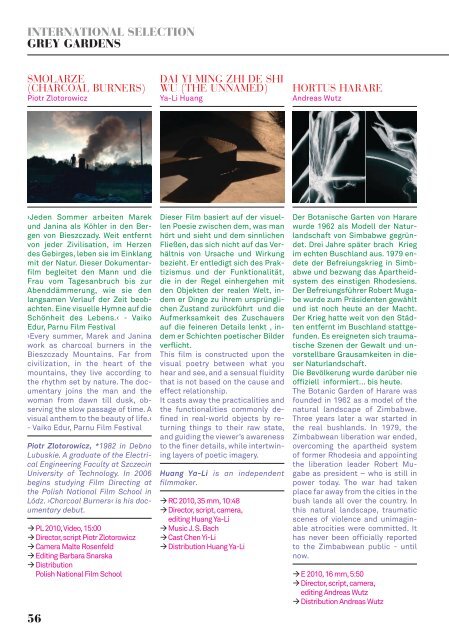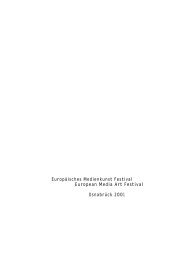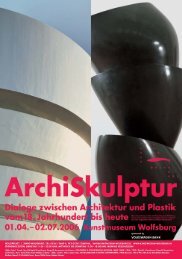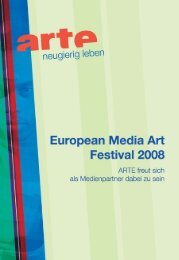EUROPEAN MEDIA ART FESTIVAL OSNABRUECK 2011 - Emaf
EUROPEAN MEDIA ART FESTIVAL OSNABRUECK 2011 - Emaf
EUROPEAN MEDIA ART FESTIVAL OSNABRUECK 2011 - Emaf
You also want an ePaper? Increase the reach of your titles
YUMPU automatically turns print PDFs into web optimized ePapers that Google loves.
INTERNATIONAL SELECTION<br />
GREY GARDENS<br />
SMOLARZE<br />
(CHARCOAL BURNERS)<br />
Piotr Zlotorowicz<br />
›Jeden Sommer arbeiten Marek<br />
und Janina als Köhler in den Bergen<br />
von Bieszczady. Weit entfernt<br />
von jeder Zivilisation, im Herzen<br />
des Gebirges, leben sie im Einklang<br />
mit der Natur. Dieser Dokumentarfilm<br />
begleitet den Mann und die<br />
Frau vom Tagesanbruch bis zur<br />
Abenddämmerung, wie sie den<br />
langsamen Verlauf der Zeit beobachten.<br />
Eine visuelle Hymne auf die<br />
Schönheit des Lebens.‹ - Vaiko<br />
Edur, Parnu Film Festival<br />
›Every summer, Marek and Janina<br />
work as charcoal burners in the<br />
Bieszczady Mountains. Far from<br />
civilization, in the heart of the<br />
mountains, they live according to<br />
the rhythm set by nature. The documentary<br />
joins the man and the<br />
woman from dawn till dusk, observing<br />
the slow passage of time. A<br />
visual anthem to the beauty of life.‹<br />
- Vaiko Edur, Parnu Film Festival<br />
Piotr Zlotorowicz, *1982 in Debno<br />
Lubuskie. A graduate of the Electrical<br />
Engineering Faculty at Szczecin<br />
University of Technology. In 2006<br />
begins studying Film Directing at<br />
the Polish National Film School in<br />
Lódz. ›Charcoal Burners‹ is his documentary<br />
debut.<br />
�PL 2010,Video, 15:00<br />
�Director, script Piotr Zlotorowicz<br />
�Camera Malte Rosenfeld<br />
�Editing Barbara Snarska<br />
�Distribution<br />
Polish National Film School<br />
56<br />
DAI YI MING ZHI DE SHI<br />
WU (THE UNNAMED)<br />
Ya-Li Huang<br />
Dieser Film basiert auf der visuellen<br />
Poesie zwischen dem, was man<br />
hört und sieht und dem sinnlichen<br />
Fließen, das sich nicht auf das Verhältnis<br />
von Ursache und Wirkung<br />
bezieht. Er entledigt sich des Praktizismus<br />
und der Funktionalität,<br />
die in der Regel einhergehen mit<br />
den Objekten der realen Welt, indem<br />
er Dinge zu ihrem ursprünglichen<br />
Zustand zurückführt und die<br />
Aufmerksamkeit des Zuschauers<br />
auf die feineren Details lenkt , indem<br />
er Schichten poetischer Bilder<br />
verflicht.<br />
This film is constructed upon the<br />
visual poetry between what you<br />
hear and see, and a sensual fluidity<br />
that is not based on the cause and<br />
effect relationship.<br />
It casts away the practicalities and<br />
the functionalities commonly defined<br />
in real-world objects by returning<br />
things to their raw state,<br />
and guiding the viewer’s awareness<br />
to the finer details, while intertwining<br />
layers of poetic imagery.<br />
Huang Ya-Li is an independent<br />
filmmaker.<br />
�RC 2010, 35 mm, 10:48<br />
�Director, script, camera,<br />
editing Huang Ya-Li<br />
�Music J. S. Bach<br />
�Cast Chen Yi-Li<br />
�Distribution Huang Ya-Li<br />
HORTUS HARARE<br />
Andreas Wutz<br />
Der Botanische Garten von Harare<br />
wurde 1962 als Modell der Naturlandschaft<br />
von Simbabwe gegründet.<br />
Drei Jahre später brach Krieg<br />
im echten Buschland aus. 1979 endete<br />
der Befreiungskrieg in Simbabwe<br />
und bezwang das Apartheidsystem<br />
des einstigen Rhodesiens.<br />
Der Befreiungsführer Robert Mugabe<br />
wurde zum Präsidenten gewählt<br />
und ist noch heute an der Macht.<br />
Der Krieg hatte weit von den Städten<br />
entfernt im Buschland stattgefunden.<br />
Es ereigneten sich traumatische<br />
Szenen der Gewalt und unvorstellbare<br />
Grausamkeiten in dieser<br />
Naturlandschaft.<br />
Die Bevölkerung wurde darüber nie<br />
offiziell informiert... bis heute.<br />
The Botanic Garden of Harare was<br />
founded in 1962 as a model of the<br />
natural landscape of Zimbabwe.<br />
Three years later a war started in<br />
the real bushlands. In 1979, the<br />
Zimbabwean liberation war ended,<br />
overcoming the apartheid system<br />
of former Rhodesia and appointing<br />
the liberation leader Robert Mugabe<br />
as president – who is still in<br />
power today. The war had taken<br />
place far away from the cities in the<br />
bush lands all over the country. In<br />
this natural landscape, traumatic<br />
scenes of violence and unimaginable<br />
atrocities were committed. It<br />
has never been officially reported<br />
to the Zimbabwean public - until<br />
now.<br />
�E 2010, 16 mm, 5:50<br />
�Director, script, camera,<br />
editing Andreas Wutz<br />
�Distribution Andreas Wutz












